|
|
|
Sort Order |
|
|
|
Items / Page
|
|
|
|
|
|
|
| Srl | Item |
| 1 |
ID:
190704
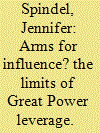

|
|
|
|
|
| Summary/Abstract |
Scholars and policymakers agree that major powers have leverage over their more junior partners. Giving security assistance or providing arms is supposed to increase this leverage. However, major powers often hit roadblocks when trying to influence the behaviour of their junior partners. This article demonstrates that junior partners are often successful in constraining the behaviour of the major power partners, and have particular success in extracting additional resources from their major partners. This article develops the concept of loyalty coercion to explain that leverage is based on rhetorical and symbolic moves, rather than material preponderance. It then uses cases of US arms sales to show that weapons transfers did not lead to US leverage, instead opened opportunities for junior partner influence. The article contributes to scholarly and policy perspectives on alliance management and reputation, and leverage in world politics.
|
|
|
|
|
|
|
|
|
|
|
|
|
|
|
|
| 2 |
ID:
084347
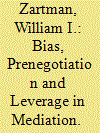

|
|
|
|
|
| Publication |
2008.
|
| Summary/Abstract |
Although analysts have long held that bias disqualifies a mediator, more recent analysis, pioneered by Saadia Touval, shows that bias can be quite helpful to mediation under the assumption that the mediator delivers the agreement of the party toward which it is biased. Of course, the mediator is still expected to be trustworthy in dealing with the parties and reliable in communications. Prenegotiation and diagnosis, probably the least analyzed early stages of negotiation, are shown to be crucial to a successful negotiation and the necessary preconditions to an efficient and effective process. Leverage, the term for "power" in negotiation, is a scarce resource and takes the form of effective persuasion rather than material inducements and punishments; it depends above all on the need of the conflicting parties for an agreement, which in turn depends on the attractiveness of their alternatives or security points (BATNAs).
|
|
|
|
|
|
|
|
|
|
|
|
|
|
|
|
| 3 |
ID:
187040
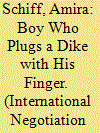

|
|
|
|
|
| Summary/Abstract |
This article highlights the United Nations’ potential contribution in the niche of crisis management. Drawing from the crisis-based approach’s insights on crisis mediation efficacy, and Carnevale’s conceptualization of the mediator’s various strengths as the sources of leverage in mediation, the study explores UN Special Coordinator for the Middle East Peace Process Nickolay Mladenov’s mediation during the Gaza-Israel crisis in 2018–2019. I argue that a combination of contextual and behavioral factors enabled Mladenov to influence the crisis bargaining environment and pull Israel and Hamas back from the brink. These factors included both parties’ need to avoid further escalation; the mediating skills of the UN envoy; the envoy’s reputation, which led others to perceive him as the right person for the mediation mission; the UN mediator’s use of a blend of strategies and tactics; and Mladenov’s ability to apply a range of strengths, including hard power.
|
|
|
|
|
|
|
|
|
|
|
|
|
|
|
|
| 4 |
ID:
167452


|
|
|
|
|
| Summary/Abstract |
President Clinton was deeply engaged and invested in the Israeli-Palestinian peace process, and this commitment seems to transcend administrations as Presidents Bush, Obama, and more recently Trump have made considerable efforts to mediate the Palestinian-Israeli conflict. This article addresses the question of why would a US president risk his own legacy and the reputation of the office as an international mediator to try to solve this complicated case in the face of expected and proven failures? This study traces efforts made by recent US Presidents to mediate the long-standing protracted conflict between Palestinians and Israel understand the reasons for the ongoing US commitment to this process, and why different presidents and their administrations persist in their mediation attempts where their predecessors failed.
|
|
|
|
|
|
|
|
|
|
|
|
|
|
|
|
| 5 |
ID:
163080
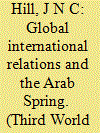

|
|
|
|
|
| Summary/Abstract |
This article contributes to the Global International Relations project by critically evaluating the roles ascribed to Europe and the EU by Levitsky and Way in their model for explaining regime transitions. Focusing primarily on their international dimensions of linkage and leverage, it assesses both the normative geopolitical underpinnings and explanatory power of their thesis, drawing on the North African cases of Tunisia and Mauritania at the start of the Arab Spring to illustrate and substantiate its observations and arguments. It concludes that the EU’s failure to discipline either country’s competitive authoritarian regime raises important questions about the validity of the privileged role in which they cast Europe.
|
|
|
|
|
|
|
|
|
|
|
|
|
|
|
|
| 6 |
ID:
174332
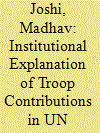

|
|
|
|
|
| Summary/Abstract |
What makes a UN member state contribute more peacekeepers to be deployed in hostile environments and place their troops at risk? A significant amount of scholarly research explores the need for, and effectiveness of, UN peacekeeping in conflict zones around the world. Few studies examine the factors that determine the size of peacekeeping contributions, and these studies do not focus on the role of neoliberal institutions. This study examines the relationship between the degree of linkages in neoliberal institutions and the size of peacekeeping contributions. I argue that the degree of linkages in neoliberal international institutions creates structural conditions that facilitate the information gathering process on the preferences and needs of UN member states and incentivize these states to contribute more peacekeeping troops. In my analysis of UN peacekeeping troop contributions data for all countries between 1990 and 2015, I find that the degree of neoliberal institutional linkages is the most consistent predictor of a UN member state’s size of peacekeeping contributions.
|
|
|
|
|
|
|
|
|
|
|
|
|
|
|
|
| 7 |
ID:
087300
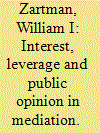

|
|
|
|
|
| Publication |
2009.
|
| Summary/Abstract |
Saadia Touval's important contributions to the study of mediation included an emphasis on the interests and motivations of mediators, hitherto often assumed to be pure or non-existent. As a result, legitimacy is usually considered to be inherent in the selfless mediator, although in internal affairs, mediation is illegitimate meddling. At the same time, much of the work on mediation either exaggerates or underestimates the nature of leverage. Public opinion also has an important but ambiguous relation to mediation. Interests, public opinion and leverage were topics where Touval helped to establish a more realistic appreciation, as illustrated in this second commemorative issue of International Negotiation.
|
|
|
|
|
|
|
|
|
|
|
|
|
|
|
|
| 8 |
ID:
087304
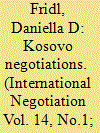

|
|
|
|
|
| Publication |
2009.
|
| Summary/Abstract |
Why do negotiations fail, how do we explain this failure through negotiations theory and what lessons can we draw for the future? What is the role of the mediator and to what extent do a mediator's values and interests affect the outcome of the negotiations? These questions are analyzed and answered through a discussion of the Kosovo negotiations and theoretical concepts of power imbalance, mediator's formula, trust, interests and perceptions. The analysis evaluates why the mediation efforts failed to produce a mutually acceptable agreement.
|
|
|
|
|
|
|
|
|
|
|
|
|
|
|
|
| 9 |
ID:
148684
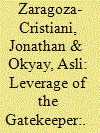

|
|
|
|
|
| Summary/Abstract |
In March 2016, the European Union and Turkey reached an agreement seeking to end the refugee flows from Turkey to Greece. This agreement is the outcome of a bargaining process in which Turkey gained considerable leverage from its position as a ‘gatekeeper’ situated between Syria and an increasingly ‘immigration-averse’ and securitised EU. More importantly, this bargaining process might have broader implications for the EU and its relations with its periphery, since Turkey has progressively reversed the asymmetries of power by demonstrating the indispensability of its continued commitment to act as gatekeeper vis-à-vis an increasingly fragmented and anxious EU.
|
|
|
|
|
|
|
|
|
|
|
|
|
|
|
|
| 10 |
ID:
187039
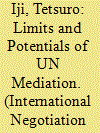

|
|
|
|
|
| Summary/Abstract |
What can UN mediators do to bring warring parties to a negotiated settlement? This article – using ripeness theory – focuses on the parties’ incentives to make a policy shift from war to settlement, and mediators’ influence over such incentives. Mediators can influence through utilizing leverage to create incentives by affecting the parties’ perceived relative power, and through applying intangible resources to facilitate incentive creation without affecting perceived relative power. The constraint on UN mediators is their lack of leverage, while their potential lies in their unique repertoire of intangible resources for facilitative influence. A recurrent limitation of UN mediation manifests where state mediators’ manipulative influence is needed to create the parties’ incentives, and UN mediators’ facilitative influence alone is not enough. On the other hand, UN mediatory potential can be utilized where the parties’ incentives are developed through their own actions and often in the face of pressure and leverage from external patrons.
|
|
|
|
|
|
|
|
|
|
|
|
|
|
|
|
| 11 |
ID:
085412
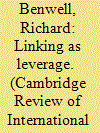

|
|
|
|
|
| Publication |
2008.
|
| Summary/Abstract |
Seven years after the United States rejected binding emissions limitations and George Bush declared the Kyoto Protocol dead, there are signs of change. There is growing interest in emissions trading at the regional, national and substate level, and in the prospect of linking schemes together. This article suggests that the rapid growth of emissions trading markets themselves may be helping to swing the cost-benefit analysis of participation in emissions reduction commitments for American actors and others. Most simply, the practical viability of international emissions trading has now been confirmed, largely by the European market, but there are two further elements to this development for which this article presents the early evidence. Firstly, unanticipated benefits appear to be accruing in the established compliance markets. Secondly, ownership of the emerging markets can bring new bargaining power to encourage others to adopt meaningful climate targets.
|
|
|
|
|
|
|
|
|
|
|
|
|
|
|
|
| 12 |
ID:
154796
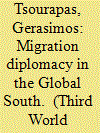

|
|
|
|
|
| Summary/Abstract |
Despite a recent resurgence in research on the politics of migration, foreign policy analysts have yet to approach cross-border population mobility as a distinct field of inquiry. Particularly within the Global South, scant work has theorised the interplay between migration and interstate bargaining. This article proposes the framework of migration diplomacy to examine how mobility features in states’ issue-linkage strategies, in both cooperative and coercive contexts. Drawing on Arabic, French and English primary sources, it empirically demonstrates the salience of its framework through an analysis of Libya’s migration diplomacy towards its Arab, African and European neighbours under Muammar Gaddafi.
|
|
|
|
|
|
|
|
|
|
|
|
|
|
|
|
| 13 |
ID:
129547
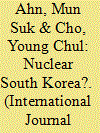

|
|
|
|
|
| Publication |
2014.
|
| Summary/Abstract |
After North Korea's third nuclear test in February 2013, South Koreans are once again debating whether to go nuclear. Some advocates of South Korean nuclear possession argue that nuclear weapons are necessary for self-defence against the nuclear-armed North. Some support South Korea's nuclearization as leverage vis-à-vis North Korea and China. Some argue that going nuclear will heighten the South's national prestige. However, others counter that South Korea's nuclearization is not desirable and, indeed, barely feasible. First, since North-South conflicts have not diminished since the 1953 truce, the nuclear armament of the two Koreas could result in a nuclear war. Second, the South's nuclearization would only hasten North Korea's ardent pursuit of securing and increasing its stock of nuclear warheads. Third, it would prompt a fierce arms race in Northeast Asia by pressing Japan and Taiwan to go nuclear. Finally, it would undermine Seoul's close ties with Washington. In order to maintain a nuclear-free South Korea, the US needs to reinforce its nuclear umbrella and eradicate the North Korean nuclear threat through active and comprehensive negotiations with Pyongyang.
|
|
|
|
|
|
|
|
|
|
|
|
|
|
|
|
| 14 |
ID:
170098
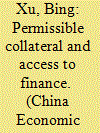

|
|
|
|
|
| Summary/Abstract |
By allowing large classes of movable assets to be used as collateral, the Property Law reform transformed the secured transactions in China. Difference-in-differences tests show firms operating with ex-ante more movable assets expand access to bank credit and prolong debt maturity. However, the reform does not seem to improve the efficiency of credit allocation, as debt capacity of ex-ante low quality firms expands the most following the reform. Credit expansion also does not lead to better firm performance. These findings are not driven by confounding factors such as improvements in creditor and property rights protection. Our results also cannot be explained by other important reforms which were introduced around the same time as the introduction of the Property Law. These include anti-tunneling and split-share reforms and amendments to the corporate tax structure in China. We conduct explicit robustness tests for these other reforms and hence contribute to the empirical literature on the reform process in China with new findings.
|
|
|
|
|
|
|
|
|
|
|
|
|
|
|
|
| 15 |
ID:
102492
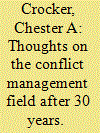

|
|
|
|
|
| Publication |
2011.
|
| Summary/Abstract |
This article surveys the emergence of conflict management from the academic and policy shadows into a far more prominent field of inquiry and practice. As the barriers to entry into third party roles collapsed at the end of the Cold War, the field of conflict management expanded, diversified, and fragmented into a range of practice areas (scholarly, policy-oriented, and operational). Four phases of this evolution are identified. An increasingly crowded field lacks gatekeepers or natural coherence, underscoring the need for leadership and sustained, coordinated efforts. The study of mediation has blossomed around the work of Zartman and others, while the policy community has swung back and forth in its enthusiasm for third party roles in an age where hard power and smart power vie for pride of place. Conflict management responses are increasingly spontaneous, ad hoc and case-specific. Debate is emerging over the pros and cons of engaging with armed non-state actors that are placed on proscribed lists in the struggle against terrorism. Post-conflict challenges continue to pose a severe test to practitioners of peacebuilding.
|
|
|
|
|
|
|
|
|
|
|
|
|
|
|
|
| 16 |
ID:
141713
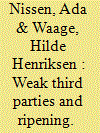

|
|
|
|
|
| Summary/Abstract |
Can weak third parties contribute to ripening conflicts for resolution despite their lack of leverage? According to the core principles of ripeness theory, mediators with leverage have a clear advantage when it comes to ripening. What is often overlooked in the literature, however, is the important ways a weak mediator can contribute to ripening as well. This article explores two noteworthy cases of weak third party ripening – the Norwegian roles in the Oslo channel between Israel and the Palestinians, and between the URNGguerrilla and the government in Guatemala. These cases demonstrate how careful interventions by weak third parties can help disputants see negotiations as a way out both in preliminary and later phases of negotiations. However, we also argue that weak third parties should not get involved in ripening unless they can call on a mediator with more leverage once substantial negotiations begin.
|
|
|
|
|
|
|
|
|
|
|
|
|
|
|
|
| 17 |
ID:
172320
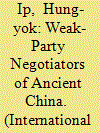

|
|
|
|
|
| Summary/Abstract |
This article situates the topic of weak-party negotiators in the context of early China. It examines the Mohists, activists known for their efforts to confront aggressive warfare in the Warring States period (476–221 BC), when various regional states competed fiercely with one another in China’s inter-state system. By examining the foundational text of Mohism, the Mozi, I show how the Mohists pioneered techniques and tactics regarded as beneficial for weak-party negotiators by modern day experts on negotiation and conflict resolution. More importantly, I emphasize that with their long and deep historical engagement with an ancient Chinese elite driven by self-interests, the Mohists pursued power and were consequential by developing their own approach to asymmetrical negotiation in war-related contexts. This approach was heavily dependent on the Mohists’ use of positive and negative leverage. And it is, according to the Mozi, made possible by the activists’ relentless pursuit of knowledge.
|
|
|
|
|
|
|
|
|
|
|
|
|
|
|
|
|
|
|
|
|